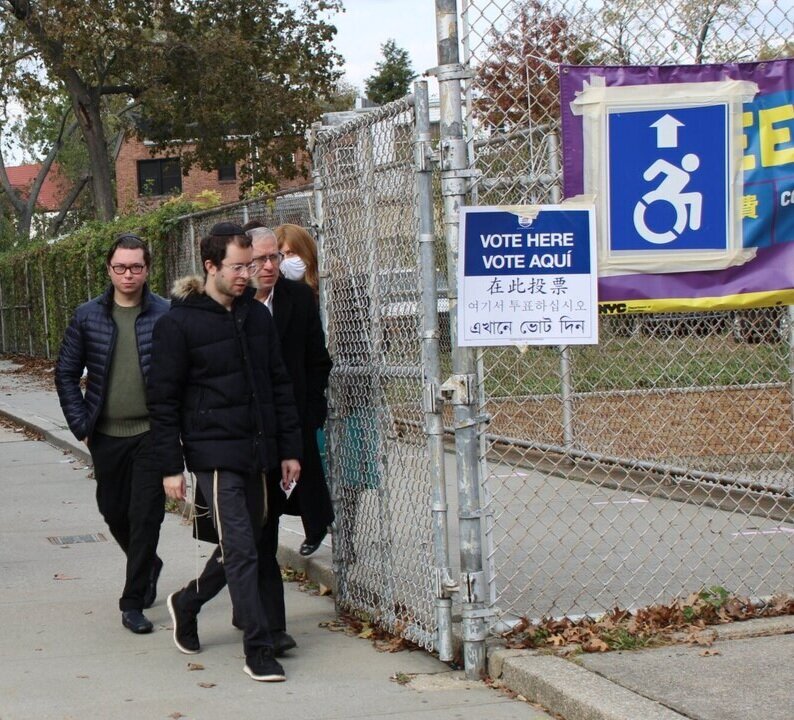Ballot, and new ranked choice voting format, set in Central Queens special election
/A group of voters leaves the polling site at P.S. 64 in Kew Gardens Hills on Nov. 3. They’ll be right back Feb. 2 to pick their next city councilmember. Eagle photo by David Brand
By David Brand
The ballot is set in the special election to replace ex-Councilmember Rory Lancman, and so too is the city’s new ranked-choice voting system after a state Supreme Court judge upheld the process Wednesday.
Manhattan Supreme Court Justice Carol Edmead ruled that the Board of Elections can move forward with ranked-choice voting in the Feb. 2 special contest for Queens’ Council District 24, determining that the upcoming distribution of military ballots prevented her from making changes so late in the game. Six city councilmembers and a host of community-based organizations had sued to block ranked-choice voting, which New Yorkers overwhelmingly voted to institute last year.
The ruling, pending an appeal, means that District 24 voters will have the opportunity to designate their top five candidates in order of preference. If no candidate receives 50 percent of the vote, the last-place finisher is eliminated and voters who picked that candidate will have their second choice tallied. That process will continue until one candidate receives a majority of the vote.
Eight candidates are vying to represent Kew Gardens Hills, Jamaica Estates, Briarwood, Pomonok and several other Central Queens communities when early voting begins Jan. 22, down from the 11 who initially filed paperwork.
Jim Gennaro, a former District 24 councilmember running to reclaim his old seat, successfully challenged the petitions of other moderate and conservative candidates, including a Republican district leader from Glen Oaks who had planned to give his ballot position to a Bukharian Jewish attorney. The attorney, Republican Leo Yakubov, threatened to split the vote among Orthodox and Bukharian Jewish residents who otherwise favor Gennaro and who make up a sizable portion of district voters, particularly in Kew Gardens Hills.
Six of the remaining candidates are South Asian, reflecting the growing influence of Bangladeshi and Indian residents in the district, particularly in Jamaica and Jamaica Hills. To date, no South Asian New Yorker has been elected to the city council.
The eventual winner may be the candidate who most successfully appeals to the district’s diverse communities.
Democratic District Leader Neeta Jain said she is actively appealing to South Asian and Orthodox Jewish constituents after working among both communities for decades as a psychologist and a community activist. Ranked-choice voting fosters coalition-building, she said.
“I feel like it’s a valid way to give communities more options to choose the best candidate,” Jain said. “We can work on common grounds.”
Small business owner Deepti Sharma and higher education executive Dilip Nath are also appealing to diverse sets of voters, including a handful of Kew Gardens Hills residents who told the Eagle they are inclined to rank them as their second or third choices after Gennaro.
Sharma “understands KGH,” said photographer Howard Schoenfield, adding that he also “might, might give a vote to Nath.”
Queens County Women’s Bar Association President Soma Syed is running a campaign focused on equity, particularly for women and low- and middle-income New Yorkers. “My entire professional life has been fighting for the needs of people on the margins,” Syed said.
Progressive organizer Moumita Ahmed has picked up several endorsements from prominent leftwing leaders and groups, including State Sen. Julia Salazar and the organization Run For Something.
Prior to her campaign, Ahmed worked for Common Cause New York, where she advocated for the 2019 ranked-choice voting ballot measure. She praised the judge’s decision to uphold ranked-choice voting after New Yorkers voted to institute the process by a 3-to-1 margin that November.
“We are really excited about the decision of the judge not to overturn the will of the voter,” Ahmed said.
She said her campaign has been encouraging voters to list her as their second choice, even if they favor another candidate. She said she will soon announce an endorsement that designates her first and another candidate second — an until-now unprecedented ranked endorsement.
A seventh candidate, Mujib Rahman, previously ran for the seat in 2013. He received 17 percent of the vote, finishing third in the Democratic primary to Lancman that year.
The eighth candidate, Michael Earl Brown, has had a circuitous path to the ballot.
The borough-hopping real estate broker first filed to run in an ongoing special election in the Bronx before seeking the seat in Queens. Brown’s petition and website indicate that he is based in Manhattan.
He was at first kicked off the ballot in District 24 before being reinstated Dec. 15, according to the Board of Elections candidate ledger. He did not respond to messages Wednesday.




